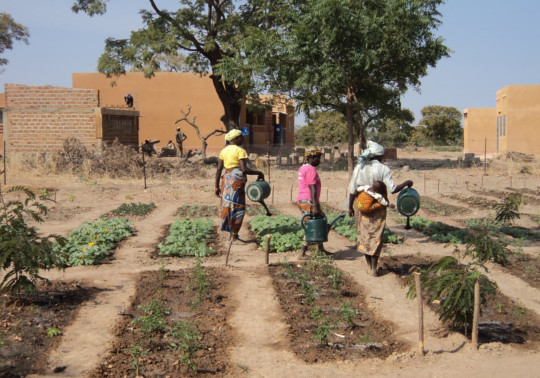The Universitat de València supports the idea of zero tolerance to female genital mutilation
- Cooperation Department
- February 13rd, 2019

The Universitat de València supports the general refusal to female genital mutilation practiced on children and teenagers, a practice which has not been eradicated in many African countries yet, in particular, in Sub-Saharan Africa.
Recently, new ablation cases practised on underage girls have been known. They took place in the rural zones of the South of Burkina Faso; cases which affect women with whom the University works and collaborates for a while through projects such as the education of women entrepreneur in the rural background of Gaoua, Burkina Faso.
The Burkina ONG APFG (Association pour la Promotion Féminine de Gaoua au Burkina Faso), a women’s organisation with which the University has collaborated since 2009, warned of the significant and worrying increase of girls and women of Gaoua subjected to the ablation of the clitoris the last month.
The local education authorities were the first in confirming this fact when they observed that there was a generalised absence of many girls. Some members of the social services went to their houses and, after the proper investigation, they found evidence of this mutilation practice, forbidden in the country since 1996.
A report developed by the Social Welfare administrator of Gaoua as a matter of urgency, which counts with the supervision of the Women Ministry of Burkina Faso, among other authorities and institutions, establishes that only the cases of the schooling girls are known (the number reaches the 37 girls according to the school principal). As there is a high number of out-of-school girls, we fear that the number exceeds the 80 girls affected by this practice. In particular, 35 cases of female ablation have been detected among students of the primary school in Kuekuera, which is close to the commune of Périgban, in the south of the country.
In total, 4 communes (Niamina, Kampti, Loropeni and Périgban) were affected by this new upturn in some localities. Through an emergency response plan carried out by the authorities, the government partially achieved its aim and they have picked up 32 of the girls affected by this practice. Moreover, they are still searching more victims in order to avoid a protracted suffering.
In spite of the predisposition of Burkina authorities to fight against this hideous practice and to offer the resources that the State disposes for the victims, the intervention teams find serious difficulties to carry out their tasks. In particular, in what concerns to the current economic resources to cover the cost of shipping, treatments, food and accommodation for the victims, etc.
The treatment of this ablation cases implies a series of steps among which a supporting project and psychosocial attention to victims to guarantee their school reinsertion, the legal persecution of the authors or accomplices, the reinforcement of surveillance of the risking communities and sessions of behaviour promotion among community leaders (elected officials, religious leaders, local press, etc.) are included.
A report of the Wassu Foundation affirms that 18,000 children coming from countries where female genital mutilation is carried out live in Spain. The control of their departure to their home countries and the activities developed in workshops with their parents try to change the subjacent mindset regarding this hideous attempt to women from these countries.
The ablation of the clitoris is an action which aims the deprivation of the women pleasure by maiming the clitoris when they are teenagers. Through this female genital mutilation women are subjected to men and they are also considered objects without any religious justification.
The Universitat de València shows its deepest refusal to these practices and reiterates its commitment to equality between women and men as well as its commitment to cooperation. Thus, an agreement is being carried out in developing zones, in particular, in the Riff, with the purpose that the lecturers of the health sector of the institution cooperate in the improvement and the development of the sexual health of women. Only education can foreclose the cultural practices which infringe upon the human rights of women subjected to this hideous mutilation and the pleasure deprivation.
One of the poorest countries in the world
Burkina Faso is one of the poorest countries in the world. According to the ONGD Intervida, only the 16% of girls continue studying after primary school, a number which shows the critical state of feminine literacy. The access to the educational system, non-developed due to the important structural and cultural problems, is not equal for both genres, indeed, women suffer the worst consequences of this non-development.
With a extreme poverty background, which is the main cause of school drop-out together with the habits and customs belonging to these countries far from encouraging the educational, social and economic development of women, precisely women have been relegated to housework since children. Shotgun weddings and early pregnancy are also causes of this school drop-out. For their parents there is no other option.
On the south of the country, where the province of Gaoua is located, has a Christian majority and a pacific social and political situation in comparison with the north of the country, where Islamic terrorism tries to undercut the government through threatens and terrorist attacks.
However, with this general mood in which the terrorist actions increase in the country as well as the radicalisation does, the State was compelled to declare a state of emergency on the 31th of December of 2018. As a result, there is a general negative mood among population, hundreds of refugees and ethnic conflicts from which the population had not suffered for four years.
File in: Fundació General UV













